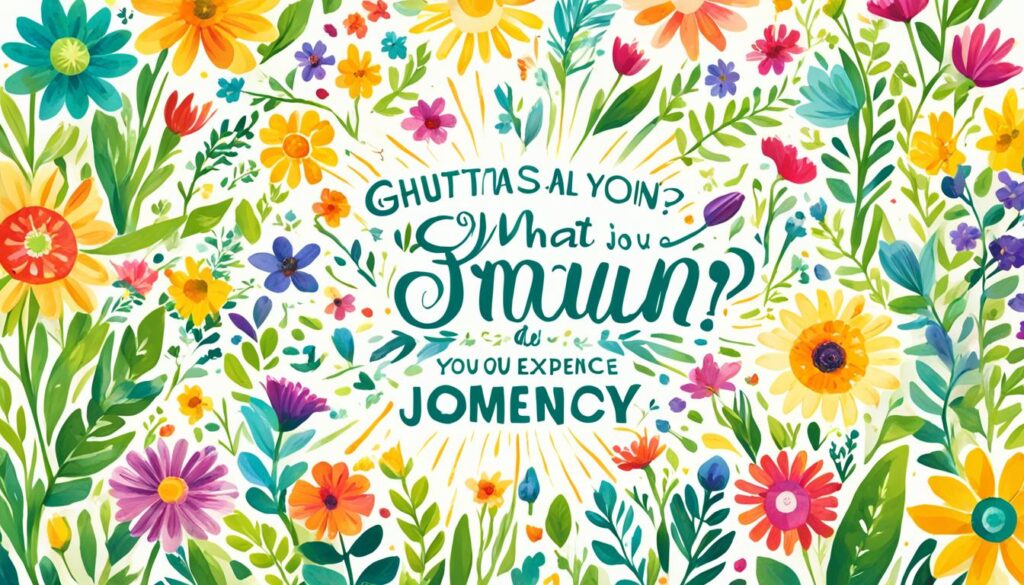“Let us rise up and be thankful, for if we didn’t learn a lot today, at least we learned a little, and if we didn’t learn a little, at least we didn’t get sick, and if we got sick, at least we didn’t die; so, let us all be thankful.” – Buddha
Practicing gratitude has the power to transform our lives and bring us immense joy. It is a simple yet profound practice that allows us to appreciate the present moment and find beauty in the everyday. By exploring gratitude questions, we can cultivate a deeper sense of appreciation and thankfulness, leading to greater happiness and fulfillment.
In this article, we will explore 20 thought-provoking gratitude questions that can inspire reflection and joy in your daily life. These questions cover various aspects of life, such as relationships, personal growth, and daily experiences. Whether you choose to use them as journal prompts or for self-reflection, these gratitude inquiries will help you develop a grateful attitude and mindset.
Key Takeaways:
- Practicing gratitude can transform our lives and bring us joy.
- Exploring gratitude questions helps cultivate appreciation and thankfulness.
- These thought-provoking inquiries cover various aspects of life.
- Use them as journal prompts or for self-reflection to develop a grateful mindset.
- Unlock the power of thankfulness and cultivate joy in your daily life.
The Benefits of Gratitude
Practicing gratitude doesn’t just feel good; it also comes with a myriad of benefits that can positively impact your life. Research in positive psychology consistently shows that cultivating a grateful attitude leads to greater measures of happiness, improved relationships, and enhanced mental strength.
Here are some of the key benefits of gratitude:
- Boost Happiness and Peace of Mind: Gratitude helps shift your focus from what you lack to what you have, promoting a positive mindset and a greater sense of contentment.
- Increase Resiliency and Empathy: Grateful individuals tend to be more resilient and empathetic, enabling them to navigate challenges with grace and compassion.
- Achieve Financial Goals: Expressing gratitude for your financial situation can help you develop positive money habits, make better financial decisions, and work towards achieving your financial goals.
- Improve Sleep: Engaging in a gratitude practice has been linked to improved sleep quality and duration, helping you wake up refreshed and ready to tackle the day.
- Form New Relationships: Gratitude fosters a positive and appreciative mindset, making you more attractive to others and enhancing your ability to develop meaningful connections.
- Enhance Mental Strength and Self-Esteem: Regularly expressing gratitude can improve your mental resilience, boost self-esteem, and contribute to overall psychological well-being.
Embracing gratitude in your life can have a profound impact on your happiness and well-being. By incorporating gratitude practices, such as keeping a gratitude journal or expressing appreciation to others, you can unlock the power of thankfulness and experience the many benefits it offers.

Gratitude Questions for Your Daily Journal
Looking for inspiration to infuse gratitude into your daily life? Incorporating gratitude questions into your journaling practice can provide a powerful tool for reflection and appreciation. These thought-provoking questions will guide you in exploring the things you are grateful for and cultivating a mindset of gratitude.
Take a moment each day to ponder these top gratitude prompts:
- What are three things you are grateful for in your immediate surroundings?
- Who are the people in your life that you appreciate the most? Why?
- What recent achievement or personal growth are you grateful for?
- What lesson did you learn from a challenging experience?
- Think about a memorable moment from today. What are you grateful for in that moment?
- What aspects of nature bring you a sense of gratitude?
- Reflect on a time when someone showed you kindness. How did it make you feel?
- What is one thing you love about yourself?
- What material possessions bring you joy and gratitude?
- What do you appreciate about your physical health and well-being?
- How have your relationships positively impacted your life?
- What opportunities are you grateful for in your career or academic pursuits?
- What special memories or experiences are you grateful to have had in your life?
- What aspects of your daily routine are you thankful for?
- What is one thing that made you smile or laugh today?
- Reflect on a challenge you overcame. What strength or skill did you discover within yourself?
- How has gratitude transformed your mindset or perspective?
- What acts of generosity have you received recently? How did they impact you?
- What goals or dreams are you grateful to be pursuing?
- Imagine your perfect day. What are you grateful for in that day?
By regularly journaling about these gratitude questions, you can deepen your appreciation for the present moment, your relationships, personal growth, and more. Embracing gratitude as a daily practice unlocks numerous benefits and helps foster a positive outlook on life.
Remember, gratitude is a gift you give yourself. Start exploring these gratitude questions today and unlock the power of thankfulness in your life.
Gratitude and Recovery
Staying grateful and focused on your goals in addiction recovery requires perseverance. Practicing gratitude can play a crucial role in maintaining a positive mindset during the recovery process. By acknowledging what you are grateful for and practicing gratitude daily, you can shift your perspective, find strength in difficult times, and build a foundation for lasting recovery. Seek support from professionals who understand the importance of gratitude in addiction recovery.
Practicing Gratitude in Recovery
- Take a few moments each day to reflect on what you are grateful for in your recovery journey.
- Write down three things you are thankful for each day, no matter how small they may seem.
- Express your gratitude towards others who have supported you on your path to recovery.
- Focus on the positive aspects of your life and the progress you have made in your recovery.
- Use gratitude as a tool to combat negative thoughts and emotions that may arise during the recovery process.
Practicing gratitude can provide a powerful shift in perspective, helping you navigate the challenges of addiction recovery with a renewed sense of hope and determination.
The Role of Gratitude in Addiction Recovery
| Benefits of Gratitude in Recovery | How to Cultivate Gratitude |
|---|---|
| Enhances overall well-being and mental health | Keep a gratitude journal and write down three things you are grateful for each day |
| Promotes a positive mindset and reduces stress | Express gratitude towards yourself for the progress you have made in your recovery |
| Strengthens relationships and social connections | Show appreciation to your support network and express gratitude for their role in your recovery |
| Provides motivation and resilience during challenging times | Focus on the positive aspects of your recovery and the lessons learned along the way |

Practicing gratitude in addiction recovery can bring about a transformation in your outlook, enabling you to overcome obstacles and thrive in your journey toward lasting sobriety. Embrace the power of gratitude in your recovery and experience the positive impact it can have on your overall well-being.
Cultivating Appreciation and Purpose
Asking ourselves gratitude questions can have a profound impact on our lives. It allows us to cultivate appreciation and a sense of purpose, bringing greater joy and fulfillment to our daily experiences. By taking the time to reflect and explore what we are truly thankful for, we can develop a deeper sense of gratitude and find meaning in our actions.
Reflecting on What You’re Thankful For
One way to cultivate appreciation is by reflecting on what you’re thankful for in your life. Consider questions such as:
- What are three things you are grateful for today?
- Who are the people that bring positivity and support to your life?
- What experiences have you had that have made a positive impact on you?
By acknowledging and appreciating the blessings in our lives, we can shift our focus from what we lack to what we have, fostering a greater sense of contentment and gratitude.
Creating a Better Day
Gratitude questions can also inspire us to make each day better. Ask yourself:
- How can you make a positive difference in someone’s life today?
- What actions can you take to bring joy and happiness into your day?
- How can you practice self-care and prioritize your well-being?
By incorporating these questions into your daily practice, you can proactively seek opportunities to create a more fulfilling and purposeful day.
Looking Ahead with Hope
Gratitude questions can help us look forward with optimism and hope. Consider:
- What are you most looking forward to in the future?
- What goals or aspirations do you have that excite you?
- What dreams have you been hesitating to pursue?
By focusing on what we look forward to, we can cultivate a sense of anticipation and motivation that propels us towards our goals and aspirations.
Finding Inspiration and Serving Others
Gratitude questions can also inspire us by considering the people who inspire us and how we can serve others. Reflect on:
- Who are the individuals that inspire you and why?
- How can you use your talents and strengths to make a positive impact on the world?
- What acts of kindness or service can you commit to today?
By acknowledging those who inspire us and finding ways to serve others, we can cultivate a deeper sense of gratitude and contribute to a more compassionate and interconnected world.
As you embark on this journey of gratitude inquiry, remember that the power lies in your willingness to reflect and explore. By incorporating these gratitude questions into your daily practice, you can cultivate appreciation and purpose, and experience the transformative power of gratitude in your life.
| Benefits of Cultivating Appreciation and Purpose |
|---|
| 1. Increased sense of happiness and fulfillment |
| 2. Greater clarity of goals and aspirations |
| 3. Deeper connections with others |
| 4. Enhanced overall well-being and satisfaction |

The Link Between Joy and Gratitude
Research has shown that joy and gratitude are closely linked. Cultivating gratitude in our lives through practices like daily reflection and expressing gratitude can significantly contribute to experiencing more joy. Gratitude helps shift our focus from what we lack to what we have, fostering a positive mindset that enhances our overall well-being. By practicing gratitude, we can invite more joy into our lives and create a positive cycle of appreciation and happiness.

The Power of Gratitude
Gratitude is a powerful emotion that has the ability to transform our lives. When we cultivate an attitude of gratitude, we train our minds to look for the good in every situation, no matter how challenging. This shift in perspective allows us to find joy in even the smallest of things.
- What are you grateful for today?
- How does expressing gratitude make you feel?
- In what ways has gratitude positively impacted your life?
- How can you incorporate more gratitude into your daily routine?
By answering these gratitude questions and reflecting on the role gratitude plays in your life, you can deepen your understanding of the link between joy and gratitude. Remember, gratitude is not just a fleeting feeling; it is a practice that can change your life for the better.
Embracing Life’s Messiness with Gratitude
Life is messy, and it’s natural to seek organization and control. However, embracing life’s messiness with gratitude can bring a shift in perspective. By acknowledging that things won’t always go according to plan and that imperfections are part of life, you can lean into the uncertainties and difficulties with a sense of gratitude.
Practicing gratitude allows you to let go of the need for control and find beauty in the messiness of life. It is a powerful tool that helps you appreciate the small moments, the lessons learned, and the growth that comes from facing challenges head-on.
The Power of Embracing Imperfections
When you embrace imperfections with gratitude, you open yourself up to new possibilities and growth. Instead of focusing on what went wrong or what could have been, you shift your attention to what you have learned, the resilience you have built, and the opportunities for growth that lie ahead.
Embracing life’s messiness with gratitude allows you to:
- Find beauty in unexpected outcomes
- Appreciate the journey, not just the destination
- Adapt and grow stronger from challenges
- Cultivate a mindset of gratitude and resilience
By embracing imperfections with gratitude, you are able to navigate life’s ups and downs with grace and resilience.
Practicing Gratitude in Challenging Situations
Life’s messiness often manifests in challenging situations that test your patience and resilience. Whether it’s a setback at work, a disagreement with a loved one, or an unexpected change of plans, approaching these situations with gratitude can make a difference.
When faced with challenges, consider asking yourself these gratitude questions:
- What can I learn from this situation?
- What am I grateful for in the midst of this challenge?
- How can I use this experience to grow and become a better person?
- Who can I lean on for support and guidance during this time?
These questions can help you shift your perspective and find gratitude even when things seem difficult. They remind you to focus on the silver linings and the opportunities for personal growth that arise from life’s messiness.
Embrace Life’s Messiness: A Table
| Benefits of Embracing Life’s Messiness | Ways to Cultivate Gratitude |
|---|---|
| 1. Builds resilience and adaptability | 1. Start a gratitude journal |
| 2. Fosters personal growth and self-reflection | 2. Practice mindfulness and presence |
| 3. Encourages empathy and understanding | 3. Express gratitude to others |
| 4. Enhances mental well-being and happiness | 4. Reflect on lessons learned from challenges |
In embracing life’s messiness, you create space for growth, gratitude, and the unexpected beauty that can arise from imperfections.
Conclusion
Gratitude has an immense impact on our lives, influencing our happiness, relationships, and overall well-being. By adopting gratitude practices like journaling and reflection, you can cultivate an attitude and mindset of gratitude. Embracing gratitude allows you to discover joy in the everyday experiences, savor the presence of loved ones, and nurture a deeper sense of purpose.
When you incorporate gratitude into your life, you shift your focus from what you lack to what you have, enabling you to appreciate the abundance around you. By acknowledging the positive aspects of your life and expressing gratitude, you invite more happiness and contentment. Gratitude becomes a powerful tool that enriches your perspective and fosters a lifestyle filled with joy.
Take the first step today and explore the gratitude questions we’ve provided. Engage in the practice of gratitude, and witness its transformative impact on your life. Unlock the power of thankfulness, and start cultivating joy through gratitude. Embrace this beautiful practice, and watch as it unfolds new layers of appreciation and fulfillment in your life.

